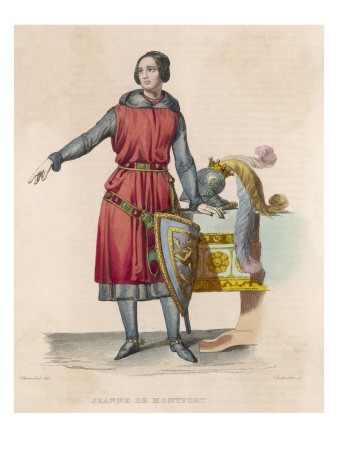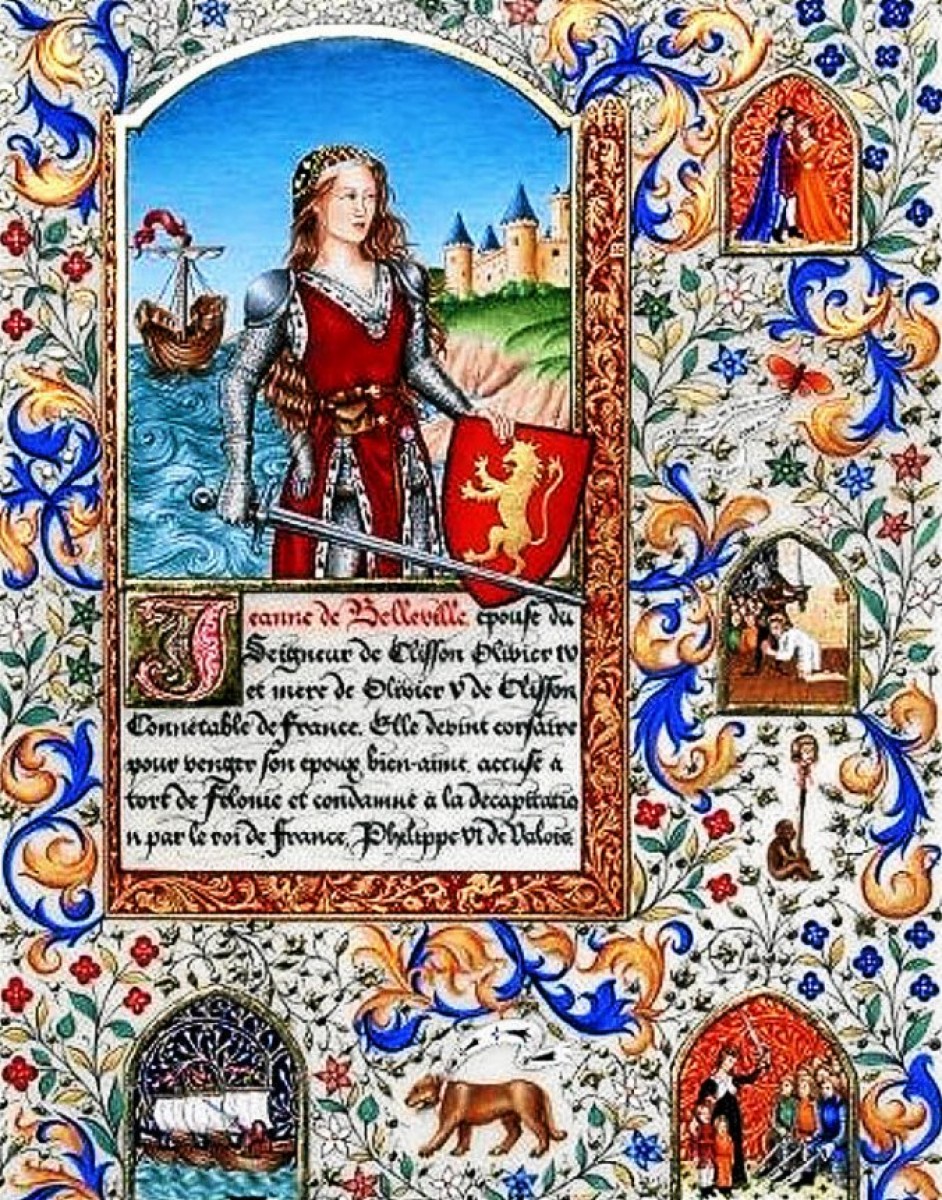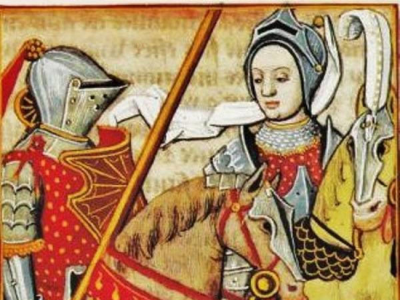| Příjmení: Surname: | de Belleville | de Belleville |
| Jméno: Given Name: | Jeanne | Jeanne |
| Jméno v originále: Original Name: | Jeanne Louise de Belleville, de Clisson | |
| Fotografie či obrázek: Photograph or Picture: | | |
| Hodnost: Rank: | - | - |
| Akademický či vědecký titul: Academic or Scientific Title: | - | - |
| Šlechtický titul: Hereditary Title: | - | - |
| Datum, místo narození: Date and Place of Birth: | DD.MM.1300 Belleville-sur-Vie | DD.MM.1300 Belleville-sur-Vie |
| Datum, místo úmrtí: Date and Place of Decease: | DD.MM.1359 Hennebont | DD.MM.1359 Hennebont |
| Nejvýznamnější funkce: (maximálně tři) Most Important Appointments: (up to three) | - | - |
| Jiné významné skutečnosti: (maximálně tři) Other Notable Facts: (up to three) | Lvice z Bretaně | Lioness of Brittany |
| Související články: Related Articles: | | |
| Zdroje: Sources: | https://en.wikipedia.org/wiki/Jeanne_de_Clisson https://fr.wikipedia.org/wiki/Jeanne_de_Belleville historyofyesterday.com | |
Belleville, Jeanne de
Jeanne de Belleville
Jeanne Louise de Belleville, de Clisson
The Maid of Brittany
She was born around 1300 in the western French town of Belleville-sur-Vie. Her father was Maurice IV de Montaigu, lord of Belleville and Pallua (1263-1304) and her mother was Létice de Parthenay. Her father married her at the age of fourteen to Baron Geoffrey VIII. Châteaubriant, by whom she had two sons, Geoffrey IX (1314-1347), who later took over the family estate but was killed in battle with the English at La Roche-Derrien in 1347, and Louis (1316-1383). However, her husband died in 1326 and two years later Jeanne married Guy VII de Limognes (1287-1331), the second son of Arthur II, Duke of Brittany. She probably did so to gain protection for her children. However, the new family did not accept her, probably because of her inferior origins, and she obtained an annulment of the marriage from Pope John XXII in 1330.
Probably in the same year, Jeanne married a third time. Her new husband was the widower and wealthy Breton nobleman Oliver IV de Clisson (b. c. 1289). Contrary to medieval customs, the newlyweds fell in love and had five children together - three sons and two daughters. In addition, Jean had brought a rather large inheritance from her first marriage, including extensive lands in the province of Poitou, which, when combined with Oliver's holdings, made a truly vast estate. In 1341, the War of the Breton Succession broke out, in which Oliver sided with Charles of Blois (1319-1364), who was at war with John of Montfort (1294-1345), who was supported by the English.
In 1342, the English captured the town of Vannes, for whose military defence Oliver was responsible. He was captured but soon released in exchange for Earl Ralph of Stafford and a very small ransom. This led to speculation that Oliver had betrayed and given up the town. In January 1343, the French and English signed a truce. Subsequently, Oliver and fifteen other Breton nobles were invited to a great tournament in Paris. Here, however, they were all arrested and executed for treason in front of King Philip VI on 2 August. Oliver's death, in particular, was a shock to the nobles, as there was no evidence for his guilt. Oliver's body was hung on the Montfaucon gallows and his head displayed on the tower at Nantes.
The news soon reaches Jeanne, who considers the act a huge betrayal and injustice. She takes her two sons, Oliver (*1336) and Guillaume (*1338), (the first-born, Maurice, lived only one year) to Nantes to swear revenge on both Philip and Charles in front of the beheaded husband and father. He subsequently sells most of his possessions and begins his personal struggle with France. Already in 1343 she and her loyalists sacked the castle of Toffou, then several other castles and garrisons, always massacring all the defenders and inhabitants.
Along with the support of the English king and some Breton lords, Jeanne buys three ships. She has them armed, supposedly painted black and the sails dyed red. She names one My Revenge. She then launches a bloody pirate campaign against French vessels in the English Channel and the ports of Normandy. He shows no mercy to his defeated opponents, executes captured noblemen with his own hands, and only lets one man live each time so that he can bear witness to the French king. These "Black Fleet" expeditions, in which her two sons also take part, have earned her the nickname "The Bloody Lioness" or "The Lioness of Brittany". The French king branded her a traitor and confiscated all her remaining possessions. However, a new income was secured for her by the English king Edward III
The French, of course, organized a hunt for the "Black Fleet"; in 1345, they managed to ambush the fleet, and Jeanne and her sons only escaped with good fortune in a lifeboat. They were adrift on the open sea, where her son Guillaume died in her arms after five days from sheer exhaustion. They were then rescued and taken to Morlaix, where they were taken in by the followers of John of Montfort. They subsequently left for England, with Jeanne continuing to support the struggle against the French. She also secured other ships which, for example, in 1346 carried supplies to the English army that was victorious at the Battle of Cressac. Her struggle did not end with Philip's death in 1350. The French king (it is not clear which one) was even to ask Pope Clement VI to ask King Edward III of England if he could stop her rampage...
In 1356, Jeanne makes her last marriage. Her chosen one was the knight Walter Bentley, one of the commanders of the English armies and holder of many lands in France. By this time, however, she was tired of revenge and settled in Hennebont, Brittany. There she died in 1359 (although some sources say it happened in England).
Her son Oliver V. de Clisson was brought up in England after 1345, became heir to the de Clisson family, landed in France in 1359 as one of the commanders of the English troops, and launched the War of the Ambush in Poitou. But in May 1360 the so-called Peace of Brétigny was signed at Calais, after which the French king John II was released from English captivity. Good, followed by a nine-year truce. War subsequently broke out anew, with Oliver soon defecting to the side of the French king Charles V, in return for which he was given lands in Normandy, and in 1380 became constable of France. He died in 1407.
Sources:
The Maid of Brittany
She was born around 1300 in the western French town of Belleville-sur-Vie. Her father was Maurice IV de Montaigu, lord of Belleville and Pallua (1263-1304) and her mother was Létice de Parthenay. Her father married her at the age of fourteen to Baron Geoffrey VIII. Châteaubriant, by whom she had two sons, Geoffrey IX (1314-1347), who later took over the family estate but was killed in battle with the English at La Roche-Derrien in 1347, and Louis (1316-1383). However, her husband died in 1326 and two years later Jeanne married Guy VII de Limognes (1287-1331), the second son of Arthur II, Duke of Brittany. She probably did so to gain protection for her children. However, the new family did not accept her, probably because of her inferior origins, and she obtained an annulment of the marriage from Pope John XXII in 1330.
Probably in the same year, Jeanne married a third time. Her new husband was the widower and wealthy Breton nobleman Oliver IV de Clisson (b. c. 1289). Contrary to medieval customs, the newlyweds fell in love and had five children together - three sons and two daughters. In addition, Jean had brought a rather large inheritance from her first marriage, including extensive lands in the province of Poitou, which, when combined with Oliver's holdings, made a truly vast estate. In 1341, the War of the Breton Succession broke out, in which Oliver sided with Charles of Blois (1319-1364), who was at war with John of Montfort (1294-1345), who was supported by the English.
In 1342, the English captured the town of Vannes, for whose military defence Oliver was responsible. He was captured but soon released in exchange for Earl Ralph of Stafford and a very small ransom. This led to speculation that Oliver had betrayed and given up the town. In January 1343, the French and English signed a truce. Subsequently, Oliver and fifteen other Breton nobles were invited to a great tournament in Paris. Here, however, they were all arrested and executed for treason in front of King Philip VI on 2 August. Oliver's death, in particular, was a shock to the nobles, as there was no evidence for his guilt. Oliver's body was hung on the Montfaucon gallows and his head displayed on the tower at Nantes.
The news soon reaches Jeanne, who considers the act a huge betrayal and injustice. She takes her two sons, Oliver (*1336) and Guillaume (*1338), (the first-born, Maurice, lived only one year) to Nantes to swear revenge on both Philip and Charles in front of the beheaded husband and father. He subsequently sells most of his possessions and begins his personal struggle with France. Already in 1343 she and her loyalists sacked the castle of Toffou, then several other castles and garrisons, always massacring all the defenders and inhabitants.
Along with the support of the English king and some Breton lords, Jeanne buys three ships. She has them armed, supposedly painted black and the sails dyed red. She names one My Revenge. She then launches a bloody pirate campaign against French vessels in the English Channel and the ports of Normandy. He shows no mercy to his defeated opponents, executes captured noblemen with his own hands, and only lets one man live each time so that he can bear witness to the French king. These "Black Fleet" expeditions, in which her two sons also take part, have earned her the nickname "The Bloody Lioness" or "The Lioness of Brittany". The French king branded her a traitor and confiscated all her remaining possessions. However, a new income was secured for her by the English king Edward III
The French, of course, organized a hunt for the "Black Fleet"; in 1345, they managed to ambush the fleet, and Jeanne and her sons only escaped with good fortune in a lifeboat. They were adrift on the open sea, where her son Guillaume died in her arms after five days from sheer exhaustion. They were then rescued and taken to Morlaix, where they were taken in by the followers of John of Montfort. They subsequently left for England, with Jeanne continuing to support the struggle against the French. She also secured other ships which, for example, in 1346 carried supplies to the English army that was victorious at the Battle of Cressac. Her struggle did not end with Philip's death in 1350. The French king (it is not clear which one) was even to ask Pope Clement VI to ask King Edward III of England if he could stop her rampage...
In 1356, Jeanne makes her last marriage. Her chosen one was the knight Walter Bentley, one of the commanders of the English armies and holder of many lands in France. By this time, however, she was tired of revenge and settled in Hennebont, Brittany. There she died in 1359 (although some sources say it happened in England).
Her son Oliver V. de Clisson was brought up in England after 1345, became heir to the de Clisson family, landed in France in 1359 as one of the commanders of the English troops, and launched the War of the Ambush in Poitou. But in May 1360 the so-called Peace of Brétigny was signed at Calais, after which the French king John II was released from English captivity. Good, followed by a nine-year truce. War subsequently broke out anew, with Oliver soon defecting to the side of the French king Charles V, in return for which he was given lands in Normandy, and in 1380 became constable of France. He died in 1407.
Sources:
https://en.wikipedia.org/wiki/Jeanne_de_Clisson
https://fr.wikipedia.org/wiki/Jeanne_de_Belleville
historyofyesterday.com
Reklama
Join us
We believe that there are people with different interests and experiences who could contribute their knowledge and ideas. If you love military history and have experience in historical research, writing articles, editing text, moderating, creating images, graphics or videos, or simply have a desire to contribute to our unique system, you can join us and help us create content that will be interesting and beneficial to other readers.
Find out more

